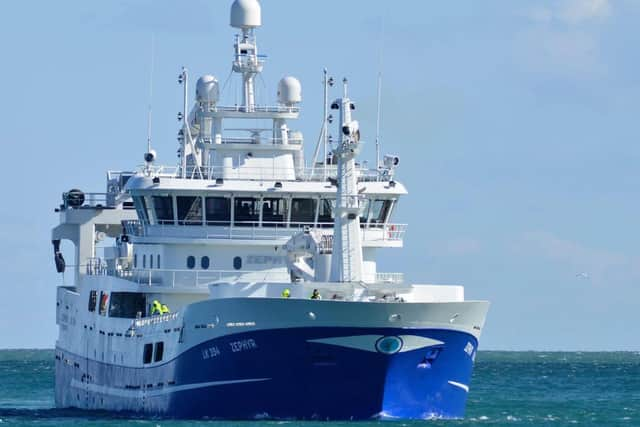Scotland's climate-smart food source - Frances Sandison


Given the Scottish Government’s commitment to reaching net zero carbon emissions, there is strong incentive for the Scottish pelagic fishing industry (mackerel, herring and blue whiting) to quantify the environmental impacts of their activities to help achieve such goals.
Scottish vessels catch approximately 65% of total fish caught in the UK. The largest and most valuable industry sector is the pelagic sector, making up 64% of all Scottish landed fish, with a value of £202 million in 2018.
Advertisement
Hide AdAdvertisement
Hide AdSeafood from both wild capture fisheries and aquaculture accounts for approximately 17% of the global population’s dietary animal protein intake (FAO, 2018). For over two fifths of the world’s population this figure increases to 20% of dietary animal protein intake (FAO, 2018).


With the projected population growth by 2050 and the commitment to meeting the UN sustainable development goals (UN, 2019), strategies for climate smart food systems need to be identified and developed. Climate smart food systems are those which meet the following criteria: they are either carbon neutral or relatively low in greenhouse gas emissions, they are resilient against climate change and extreme weather events and they have the ability to be sustainably increased to meet growing demand.
I have just published the most recent study, “The environmental impacts of pelagic fish caught by Scottish vessels” as part of my PhD studies and funded by the Scottish Pelagic Sustainability Group, Shetland Islands Council, University of Aberdeen, University of the Highlands and Islands, and Shetland Fish Producers’ Organisation.
My study found that Scottish-caught pelagic fish have a low carbon footprint and environmental impact when compared to other seafood products including farmed salmon, demersal fish and shellfish. This includes UK farmed salmon, which is 7.2 times higher, and Norwegian caught cod and haddock, which are 3.5 and 3.9 times higher than Scottish caught pelagic fish.
This extended my earlier finding at the NAFC Marine Centre (which is part of the University of the Highlands and Islands) which revealed that the carbon footprint of the Shetland mackerel trawl fishery was much lower compared to land-based meat production, including chicken, beef and pork. Seafood production in general has a lower carbon footprint than land-based meat production.
This confirms that that sustainably managed Scottish pelagic fish represents a climate smart food source that helps deliver targets for achieving net zero carbon.
My environmental impact study also found that fuel consumption in the fishing phase is the main contributor of carbon emissions. Enhancing fuel efficiency through innovations in vessel design and fishing practices, and a transition to alternative fuel sources are part of the Scottish pelagic sector’s efforts to minimise emissions.
In Scotland we have access to a fantastically low impact, highly nutritious, locally caught source of protein. Compared to other meat sources the choice is clear for the environmentally conscious consumer – we should be eating more local pelagic fish.
Advertisement
Hide AdAdvertisement
Hide AdIan Gatt, chairman of the Scottish Pelagic Sustainability Group, said: “We congratulate Frances on the successful completion of her research. For the Scottish pelagic sector there is a lot at stake with climate change, given that mackerel and herring have an established global trade that helps ensure food security as an affordable and nutritious protein in many parts of the world. Scottish fishermen have invested heavily in modern vessels and fish handling systems, and processors in the latest equipment, to ensure a high quality, low carbon footprint product that can be delivered to market in the most efficient manner.
“As such, Scottish mackerel and herring production really do tick all the right boxes when it comes to sustainability, nutrition, and low carbon footprint.”
Frances Sandison, scientific researcher, Scottish Pelagic Sustainability Group
Comments
Want to join the conversation? Please or to comment on this article.